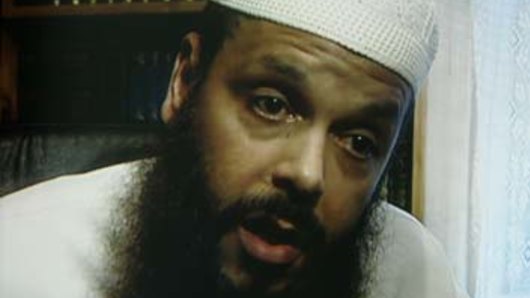
Save articles for later
Add articles to your saved list and come back to them any time.
A Supreme Court judge has ordered the release of convicted terror cell leader Abdul Nacer Benbrika on a strict supervision order, ending a years-long legal battle waged by the government to keep him behind bars beyond his sentence.
Benbrika’s legal team successfully argued the notorious Muslim cleric should be released from a continuing detention order, which has kept him inside Barwon Prison since 2020, after he finished serving a 15-year sentence for terror offences. The government subsequently agreed.
Terrorism plot: Abdul Nacer Benbrika has won a High Court bid to retain his Australian citizenship.Credit: ABC
Supreme Court judge Elizabeth Hollingworth said the government and Benbrika’s lawyers agreed he should be subject to a less restrictive extended supervision order (ESO) and should instead go back into the community, with conditions to minimise any risk the cleric poses to the public.
“Both parties accept that the continuing detention order should be replaced by an extended supervision order on the basis of Mr Benbrika’s reduced risk of offending,” Hollingworth said.
“The evidence clearly establishes, and the Attorney-General quite clearly accepts, that Mr Benbrika has been making substantial progress towards de-radicalisation in recent years.
“The risk of offending is now low enough that it can be managed by Mr Benbrika living in the community on a strict ESO.”
Benbrika will be on the ESO for one year.
The more than 30 conditions include a curfew, living at a specific address that he cannot change without permission from authorities and answering the door when called upon by police. He must also continue receiving psychological treatment and continue to engage with de-radicalisation programs.
His treating psychologists may also disclose any information that might concern the safety of people in the community, he must wear an electronic monitoring device, and he must not associate or communicate with people who live in certain countries, who are in prison or who have been convicted of terror offences.
Benbrika can also only start working or volunteering with the permission of federal police, has strict rules around financial transactions and is prohibited from making public speeches about certain topics.
Abdul Nacer BenbrikaCredit:
He is also subject to strict conditions regarding the use of mobile phones and other electronic devices, and cannot possess weapons and other objects which could be used as weapons.
Federal police can also perform searches to ensure Benbrika’s compliance with the conditions.
Benbrika, a grandfather who goes by Nacer, appeared from Barwon Prison’s Piper Unit, a prison unit designed for dangerous offenders, in a blue robe to watch the hearing in the Supreme Court. He is expected to be released later on Tuesday.
Following a federal police operation, Benbrika was convicted in 2009 of directing a terrorist organisation. A jury found him guilty of being the spiritual leader of a terror cell with members in Melbourne and Sydney that planned attacks on Australian soil.
Benbrika’s group discussed carrying out attacks because it wanted the Australian government to withdraw troops from Iraq and Afghanistan. No attacks were ever carried out.
His ongoing detention has presented considerable political and legal complications for the government since 2020.
The court heard that over the past few years, Benbrika has participated in de-radicalisation programs, engaged with prison psychologists and consistently spoke with an Islamic scholar who had successfully challenged his strict interpretation of Islamic doctrine.
Last week, the former watchdog for Australia’s national security laws, Grant Donaldson, SC, labelled the Commonwealth’s treatment of Benbrika a disgrace and criticised his continued detention using the government’s risk assessment tool, VERA-2R.
In his final report, Donaldson said the government had failed to explain why it had concealed a secret report criticising the efficacy of VERA-2R.
Grant Donaldson SC has finished his statutory role as the Independent National Security Legislation Monitor.
VERA-2R – the Violent Extremism Risk Assessment 2 Revised – is used to measure the threat posed by extremists, often when determining whether they should be subject to restrictions once they have completed their prison sentence.
Hollingworth said on Tuesday that the government repeatedly failed to disclose the report to the court or Benbrika’s lawyers in breach of obligations under national security legislation.
The court also heard that the government had consistently failed to comply with deadlines to provide documents to the court and had not disclosed several other relevant reports.
Hollingworth labelled the government’s conduct “totally unacceptable,” saying it “does not reflect well on the government”. She said she intended to report the instances of non-disclosure to the new national security watchdog to examine the government’s breaches.
Attorney-General Mark Dreyfus said on Monday that he made the application for the three-year supervision order in February on the basis of advice from agencies such as the Australian Federal Police.
The application was stalled due to Benbrika’s ultimately successful High Court bid to overturn a law allowing the federal government to strip him of his Australian citizenship, prompting Home Affairs Minister Clare O’Neil to pass new laws placing the power to do so with the courts.
More to come.
Cut through the noise of federal politics with news, views and expert analysis from Jacqueline Maley. Subscribers can sign up to our weekly Inside Politics newsletter here.
Most Viewed in National
From our partners
Source: Read Full Article


